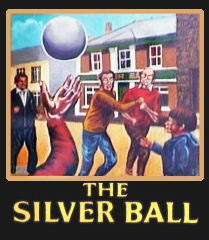Cornish hurling
For the Irish sport of hurling, see Hurling
Hurling the silver ball is an old sport unique to Cornwall.
Game

A silver hurling ball which is the size of an orange, made from applewood and coated with silver flies through the village streets of St Ives, Cornwall on Feast Monday in February (the feast is on the Sunday nearest to February 3), and at St Columb on Shrove Tuesday and the Saturday of the following week. At St Columb, the struggle is a physical battle between "Town" and "Country" with the shops in the town barricading their windows and doors for the start of the scrum at 4:30 p.m. The ball is thrown to the crowd at the market square and the objective of the game is to control it through the town or country goals set about two miles apart or, if this isn't possible, the ball may be carried over the Parish boundary. At 8:00 p.m., a winner returns to declare victory for Town or Country.
Hurling Trivia
- There is no referee.
- There are no written rules.
- There is no organizing commitee
- The teams are not even in size. Town will always out number the Country. Before the Wars the teams were more evenly matched.
- To win you must carry the ball to your own goal.
- Another way to win is to carry the ball out of the parish, which can be up to 3 miles.
- As soon as a the ball is goaled or carried out of the parish, the game finishes.
- The game takes place mainly in the street where cars still pass up and down! The game can also extend onto private property including gardens fields and sometimes through houses or pubs.
- The game can stop at any time so that members of the watching crowd can handle the ball.
- Touching the ball is said to be lucky and can bring good health and fertility.
- Serious injuries are very rare.
- The ball is made from sterling silver which encases a ball of apple wood.
- There is only one maker of the ball.
- The winner of the ball has the right to keep it, but must have a new one made in its place for the next game.
- The price of a new ball is secret but is said to be around £300.UKP.
- The ball weighs just over a pound.
- The origin of the game is known to be over 500 years.
- There are only 2 games a year.
- The first game is always on Shrove Tuesday.
- The second game is on the Saturday of the following week.
- The game is always started at 4.30 pm.
- The game can last anything up to 2 hours.
- After the game the ball is always returned to the start point.
- The game attracts vistors from miles away but most watchers are local to the area.
- In the evening the ball is taken around the pubs of the town and dipped into a gallon jug of beer and is shared out.
- Drinking "Silver beer" gives you good luck and good health.
- The parish of St Columb Major is the worlds largest pitch for any ball game.
- In the last 100 years there have been 2 lost balls.
History

There was a time when the silver ball was part of the tradition of many Cornish villages; sadly now, only two continue the practice. The large style motto was reintroduced in 1999 and encourages
'Town and Country, Do Your Best'
Historian Richard Carew wrote about Cornish hurling:
- Two bushes are pitched in the ground eight or twelve feet asunder, directly against which at a distance ten or twelve yards apart two more bushes, in like manner, which are called goals.The hurlers to goals are bound to observe these orders or Laws:
- ln contending for the ball, if a man's body touches the ground, and he cries `Hold' and delivers the ball, he is not to be further pressed.
- That the hurler must deal no foreball, or throw it to any partner standing nearer the goal than himself. In dealing the ball, if any of the adverse party can catch it flying ... the property of it is thereby transferred to the catching party; and so assailants become defendants, and defendant assailants.
References
"Hurling at St Columb and in Cornwall" by Ivan Rabey, 1972, Lodenek P, ISBN 0902899112
"Survey of Cornwall" by Sir Richard Carew, 1602, New York, 1969, pp. 147-149
